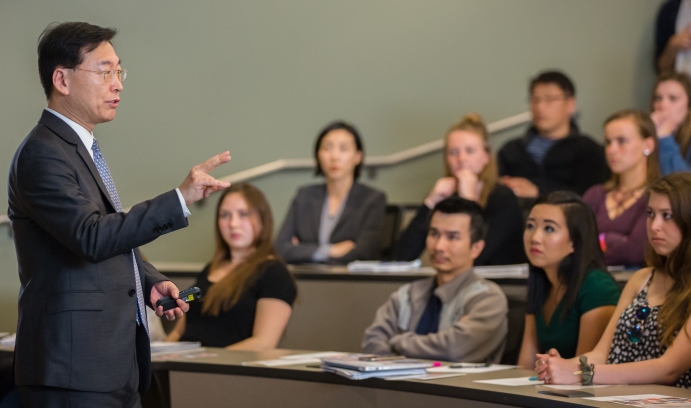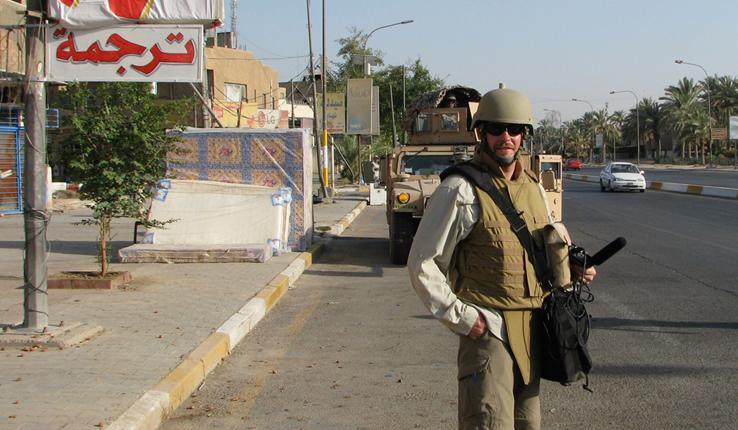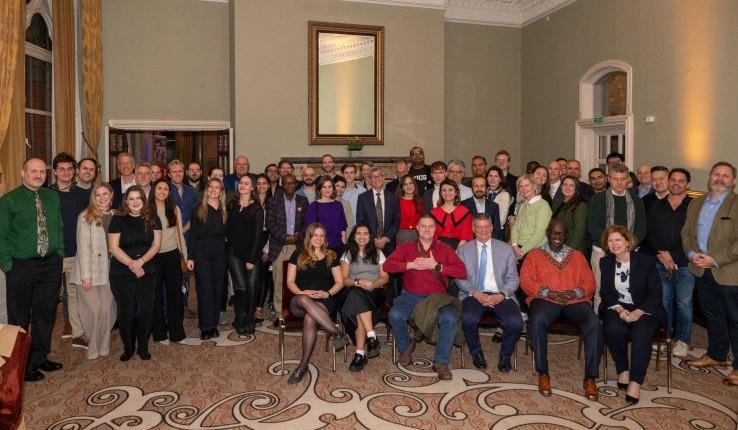U.N. Official Urges Continued Sanctions Against North Korea

Only the “determination of the international community” can dissuade North Korea from developing nuclear weapons, Hahn Choonghee, South Korea’s ambassador to the United Nations, told students on Tuesday, April 18. (Photo by Christa Neu)
North Korea has disregarded United Nations resolutions and provoked its neighbors with tests of missiles and nuclear weapons, South Korea’s ambassador to the U.N. said here yesterday, but Koreans are hopeful that peace and the eventual unification of the two Koreas can be achieved.
Hahn Choonghee’s address came as U.S. Vice President Mike Pence, in a visit to South Korea, warned North Korea not to test American resolve or “the strength of our military forces” following the failed test of the latest missile, possibly a medium-range missile, by North Korea last weekend.
Hahn spoke to about 100 students in the STEPS building. His visit was sponsored by the Lehigh/U.N. Partnership, the international relations department and the Lehigh Korean Student Association.
North Korea, Hahn said, insists that it has a “non-negotiable right” to develop weapons and has conducted five nuclear weapons tests and more than 30 missile launches since the beginning of 2016. These include submarine-launched ballistic missiles (SLBMs), Scud missiles (surface-to-surface missiles that can be fired from mobile launchers) and technology that would make it impossible to determine the origin of an attack.
“The North Koreans have never stopped trying to develop a nuclear weapons capability,” said Hahn. “They are totally violating all the agreements that they signed.”
Ruled for more than 60 years by the Kim dynasty and since 2011 by 33-year-old “supreme leader” Kim Jong-Un, North Korea is seeking to drive a wedge between the U.S. and China, its neighbor to the north, and between the U.S. and South Korea, Hahn said. The country’s eventual goal, he added, is to gain the ability to launch a missile attack on the U.S. mainland.
In response, Hahn said, the nations of the world, especially, the U.S., South Korea and China should show a “unified front” that includes sanctions and bans on North Korean exports. China in February announced it would stop importing North Korean coal, the country’s main export.
Hahn noted that the policy of U.S. President Donald Trump’s administration—“Maximum pressure and engagement”—represents a departure from the Obama administration’s policy of “strategic patience.” Trump and Chinese President Xi Jinping met for a two-day summit at Trump’s Florida estate in early April, before the most recent North Korean weapons tests.
“Since that summit, there have been interesting developments,” Hahn said, noting that, according to some news reports, China would consider cutting off its exports of oil to North Korea if it conducted another missile or nuclear test.
“It would be a real game-changer,” he said, “if China followed through on this pre-emptive warning to North Korea.”
The uncertainty that prevails on the Korean peninsula, Hahn said, increase the possibility that misperceptions and miscalculations by one side or the other “might trigger a military confrontation.”
The United States has no interest in invading North Korea, Hahn said, but North Korea nonetheless uses the pretense of an alleged American desire for hostilities to justify its testing of missiles and nuclear weapons and to generate and sustain support for the Kim regime.
This tactic was illustrated in early 2012, Hahn said. On Feb. 29, 2012, the United States and North Korea signed a “leap day” agreement under which the U.S. promised food aid to North Korea in exchange for a moratorium by Pyongyang on uranium enrichment and missile testing. The agreement also allowed for the return of International Atomic Energy Agency inspectors to North Korea and an eventual resumption of six-party talks involving the U.S., China, Japan, Russia, South Korea and North Korea.
Two weeks later, however, Pyongyang conducted another failed rocket test, Hahn said.
“This up-and-down behavior means that North Korea has never had any intention of abandoning its military activities,” he said. “Instead, they are trying to hide and to cheat.”
The only way to avoid a military confrontation involving North Korea on the one hand and the U.S. and South Korea on the other, Hahn said, is “continuation of strong U.N. sanctions.
“This is very important. It is the only justifiable way to pressure North Korea. For the time being, we should stick to the implementation of U.N. sanctions. If North Korea sees the determination of the international community, it will change its course of action.”
The Lehigh/U.N. Partnership enables more than 1,500 Lehigh faculty members, students and staff members each year to attend U.N. conferences, briefings and private meetings with ambassadors and other U.N. officials.
The partnership dates from 2004, when Lehigh became the sixth university in the world to gain NGO (nongovernmental) status with the world body, specifically with the U.N.’s Department of Public Information.
Story by Kurt Pfitzer
Posted on:




